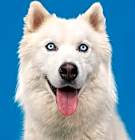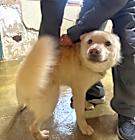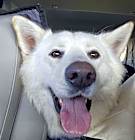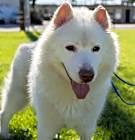Samoyeds are medium to large-sized dogs. Typically, male Samoyeds stand between 21 to 23.5 inches tall at the shoulder and weigh between 45 and 65 pounds, while females are slightly smaller, ranging from 19 to 21 inches and weighing between 35 and 50 pounds.
Samoyed
Breed Type: Working
Common nicknames: The Sammy, Laughing Cavalier
Coat: Double
Hypoallergenic: No, they will likely trigger allergies.
Temperament: Friendly, affectionate, playful, gentle
Life expectancy: 12-15 years
Color & patterns: White

These beautiful dogs — who typically weigh between 50 and 60 pounds and are also known by their adorable nickname, the “Smiling Sammies” — are known for their trademark thick white fur. But one of the best things about this breed is their charming personalities and happy-go-lucky attitude — they love being around people and will happily accompany you on walks or snuggle up with you on the couch. They also make great family pets, as they are gentle and patient with children. Originally bred in Siberia as working dogs, the Samoyed’s main jobs were to herd reindeer, pull sleds, and keep their owners warm in the cold Siberian winters. Despite their size and history, they are adaptable and can thrive in small spaces as long as they get plenty of exercise and attention.
Samoyed characteristics
Learn about about Samoyed basics like their fur colors, shedding levels, how much grooming they need, and other Samoyed facts.
Average height
18-22 inches (45.7-55.9cm)
Average weight
37-70 pounds (16.8-31.8 kg)
Average lifespan
12-15 years
Exercise needs
Grooming needs
Full-grown size
Good with cats
Good with kids
Training aptitude
Do Samoyeds shed?
Yes, Samoyeds shed. They have a thick double coat that sheds seasonally, with heavier shedding occurring twice a year. Regular grooming, such as brushing their coat, can help manage shedding and keep their coat healthy.
What colors do Samoyeds come in?
Samoyeds primarily come in white or cream colors. Some may have biscuit or biscuit and cream markings on their face, but overall, their coat is predominantly white or cream.
How to pronounce Samoyed?
The correct pronunciation of Samoyed is “SAM-oh-yed.”
When is a Samoyed full grown?
A Samoyed is usually considered fully grown between 12 to 18 months of age. However, some Samoyed may continue to fill out and develop muscle after this period.
How long do Samoyeds live?
On average, Samoyeds live for about 12 to 14 years. Individual lifespan can vary, however, based on genetics, diet, exercise, veterinary care, and overall health management.
Samoyed health
Learn about about the Samoyed health outlook and what diseases they may be prone to at various stages of their life.
Do Samoyeds have health problems?
Like all breeds, Samoyeds can be prone to certain health issues, including:
Hip and/or elbow dysplasia: Hip and elbow dysplasia are two of the most common skeletal diseases seen in dogs. They are similar diseases in which either the hip or elbow joint has grown abnormally or is misshapen. The abnormal shape prevents the joints and sockets from adequately meeting one another, resulting in rubbing and grinding instead of sliding smoothly. Though the main complication with hip dysplasia is joint instability, the abnormalities present in elbow dysplasia often result in pieces of bone and/or cartilage breaking loose and irritating the joint tissues. Over time, the rubbing from dysplasia can cause a variety of issues, such as pain, lameness, and secondary osteoarthritis. Surgery can be done to fix the joint if diagnosed before the onset of arthritis. If you are rescuing a Samoyed, have them checked out by a vet to see if they have or are prone to getting dysplasia, so you know what they will be able to handle regarding activities and exercise.
Subaortic stenosis: Subaortic stenosis is an inherited heart condition that is most common in larger breed dogs and is present at birth. It occurs when a dog is born with an abnormally narrow aortic valve, which controls blood flow from the left ventricle to the aorta. The narrowing makes it difficult for blood to flow properly through the heart and can cause fainting and even sudden death. Your vet can detect it and prescribe the proper treatment.
Eye problems: Samoyeds may be prone to progressive retinal atrophy (PRA), a progressive degenerative disease affecting the retina that eventually leads to blindness; cataracts, a common eye condition that causes cloudiness in the eye and obstructs vision; and glaucoma, a disease that causes excessive pressure on the eye, damages the optic nerve and eventually leads to vision loss and blindness.
Samoyed hereditary glomerulopathy: This genetic kidney disease can cause kidney failure in Samoyed males.
Gastric dilatation-volvulus: This is a sudden, painful, and life-threatening swelling and twisting of the abdomen.
Others: Samoyed may also be prone to cancer, diabetes, and hypothyroidism, a thyroid malfunction that results in low hormone production and could cause obesity, low energy, and a brittle coat.
Responsible breeding practices and regular veterinary check-ups can help minimize the risk of these health problems.
Can you shave a Samoyed?
It’s generally not recommended to shave a Samoyed’s coat. Their double coat serves as insulation, keeping them cool in the summer and warm in the winter. Shaving can disrupt their natural ability to regulate body temperature and may lead to skin problems. Instead of shaving, regular brushing and grooming to remove loose fur can help keep them comfortable and reduce shedding.
Are Samoyeds hypoallergenic?
No, Samoyeds are not considered hypoallergenic. They have a thick double coat that sheds seasonally, which can release dander and trigger allergies in some people. Regular grooming and vacuuming can help reduce allergens in the home.
Samoyed history
Learn about where this Samoyed came from!
Where are Samoyeds from?
Samoyeds originate from Siberia, where the Samoyedic people bred them to help herd reindeer and pull sleds. Their thick, insulating coat and friendly disposition made them invaluable companions, and they eventually gained popularity as working dogs and beloved pets in other parts of the world.
Samoyed temperament
Learn about about the Samoyed temperament and how well they fit into your lifestyle, home environment, and family.
Are Samoyeds good with kids?
Yes, Samoyeds can be great with kids. They’re playful and gentle, making them good companions for children.
However, as with any dog breed, it’s important to supervise interactions between Samoyeds and children to ensure that both the dog and the child are behaving appropriately and safely. Proper training and socialization from an early age can also help ensure that Samoyeds and children get along well together. Teaching children how to properly approach and handle dogs is also crucial to ensure positive experiences for both the dog and the child.
Are Samoyeds good family dogs?
Yes, Samoyeds are typically good family dogs. They’re friendly, affectionate, and often get along well with all family members, including children and other pets.
As with any breed, though, it is recommended that your child is always supervised when interacting with your dog to keep both the child and dog safe. Teaching children how to properly approach and handle dogs is crucial to ensure positive experiences for both the dog and the child, as is teaching dogs how to interact gently with children.
Are Samoyeds aggressive?
No, Samoyeds are not aggressive dogs. They’re usually friendly and gentle, but like any breed, individual temperament can vary. Proper socialization and training can help ensure they grow up to be well-behaved.
If you are concerned by any signs of aggression or reactivity in your dog, be sure to address it promptly with the help of a professional trainer or behaviorist. Pain, discomfort, or underlying medical conditions can sometimes contribute to changes in a dog’s behavior, so it may also be worth visiting a vet to rule out their health as a cause for their behavior.
Are Samoyeds easy to train?
No, training a Samoyed is not typically easy because of their independent and sometimes stubborn nature. However, training any dog takes substantial time and effort, regardless of breed, and consistency, positive reinforcement, and patience are key when training them.
Are Samoyeds smart?
Yes, Samoyeds are generally considered smart dogs. They’re quick learners and can excel in various activities such as obedience, agility, and even some advanced tricks. Samoyeds are also known for their problem-solving abilities and adaptability, which contribute to their reputation for being intelligent.
Are Samoyeds good for first-time pet parents?
No, Samoyeds might not be the best choice for first-time pet parents due to their training needs and grooming requirements. They require regular exercise, mental stimulation, and grooming to keep them happy and healthy.
Can a Samoyed be a service dog?
Yes, Samoyeds can be trained as service dogs. Their intelligence, loyalty, and willingness to please make them suitable candidates for various service roles, such as therapy or assistance dogs.
Can Samoyeds live in hot weather?
Samoyeds have a thick double coat that insulates them against cold weather, but they can also adapt to warmer climates with proper care. It’s essential to provide them with shade and plenty of fresh water and avoid exercising them during the hottest parts of the day to help them stay comfortable in hot weather. Regular grooming to remove loose fur can also help them regulate their body temperature better.
Are Samoyeds friendly?
Yes, Samoyeds are generally friendly dogs. They’re known for their sociable and outgoing nature, often enjoying the company of people and other pets.
Are Samoyeds good with other dogs?
Yes, Samoyeds can get along well with other dogs, especially when they’re socialized from a young age. Their friendly nature often makes them good companions in multi-dog households. Proper socialization from a young age and positive experiences with other dogs can help Samoyeds develop good social skills and get along well with their canine counterparts.
Are Samoyeds good with cats?
Yes, Samoyed can be good with cats. However, this interaction depends on the individual dog and cat. With proper socialization and training, many Samoyeds can get along well with cats. However, their strong prey drive may lead them to chase smaller animals, so it’s important to supervise their interactions with cats.
Do Samoyeds bark a lot?
Yes, Samoyeds are known to be vocal dogs, so they can bark quite a bit. They may bark to alert their family of strangers or unusual sounds, but they’re generally not excessive barkers. Training and proper socialization can play a significant role in managing this breed’s barking tendencies. Providing them with mental and physical stimulation can also help reduce boredom-related barking.
Are Samoyeds good apartment dogs?
Samoyeds can adapt to apartment living, but it’s not their ideal environment. They’re active dogs who require regular exercise and mental stimulation. A lack of space and exercise might lead to boredom and destructive behavior. However, with proper exercise and mental enrichment, they can live happily in an apartment.
Are Samoyeds high energy?
Samoyeds are indeed high-energy dogs. They’re bred for endurance and hard work, so they require regular exercise to keep them physically and mentally stimulated. Activities such as daily walks, playtime, and training sessions can help burn off their energy and keep them happy and healthy.
Popular Samoyed mixes
Some common Samoyed mixes include:
Golden Sammy (Samoyed + Golden Retriever)
Samusky (Samoyed + Siberian Husky)
Sammypoo (Samoyed + Poodle)

Find Samoyed puppies near you
Adopting a Samoyed
Learn about acquiring a Samoyed - the pros and cons of adopting versus going through a breeder, and associated costs.

Dandy
Samoyed
Male, 1 yr 7 mos
Los Angeles, CA
Good with dogs
Not good with cats
House-trained
Spayed or Neutered
Shots are up-to-date

Deokgu
Samoyed Jindo
Male, 1 yr 4 mos
Torrance, CA
Good with dogs
Not good with cats
House-trained
Spayed or Neutered
Shots are up-to-date

BOO
Samoyed
Female, young
Sierra Madre, CA
Not good with dogs
Not good with cats
House-trained
Spayed or Neutered

RYDEN
Samoyed
Male, adult
Sierra Madre, CA
Not good with dogs
Not good with cats
House-trained
Spayed or Neutered

BonBon
Samoyed
Male, young
Sierra Madre, CA
Good with dogs
Not good with cats
House-trained
Spayed or Neutered
Shots are up-to-date

Dandy
Samoyed
Male, 1 yr 7 mos
Los Angeles, CA
Good with dogs
Not good with cats
House-trained
Spayed or Neutered
Shots are up-to-date

Deokgu
Samoyed Jindo
Male, 1 yr 4 mos
Torrance, CA
Good with dogs
Not good with cats
House-trained
Spayed or Neutered
Shots are up-to-date

BOO
Samoyed
Female, young
Sierra Madre, CA
Not good with dogs
Not good with cats
House-trained
Spayed or Neutered

RYDEN
Samoyed
Male, adult
Sierra Madre, CA
Not good with dogs
Not good with cats
House-trained
Spayed or Neutered

BonBon
Samoyed
Male, young
Sierra Madre, CA
Good with dogs
Not good with cats
House-trained
Spayed or Neutered
Shots are up-to-date







